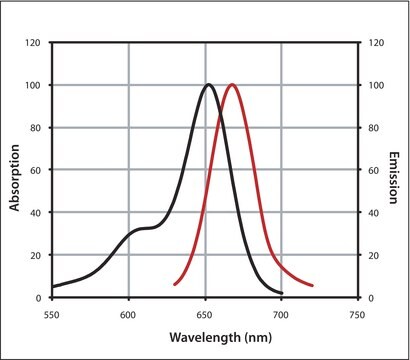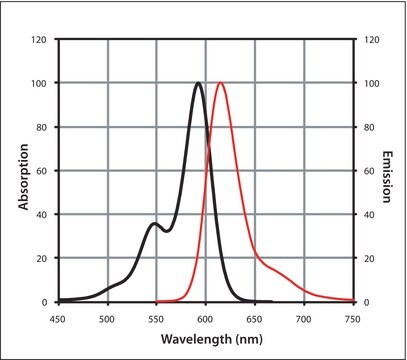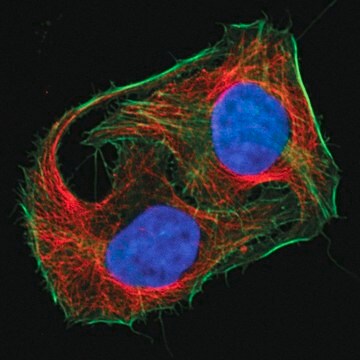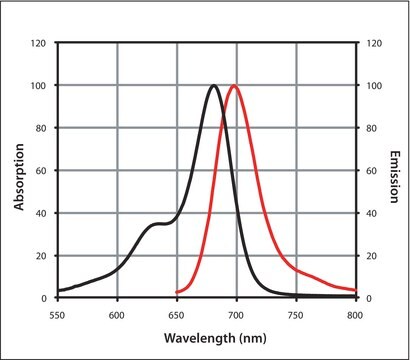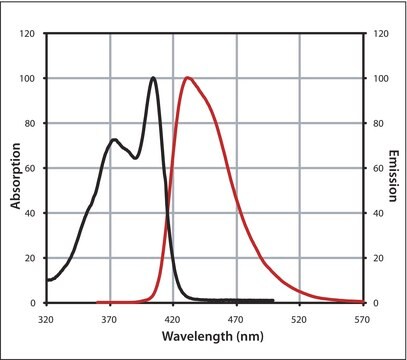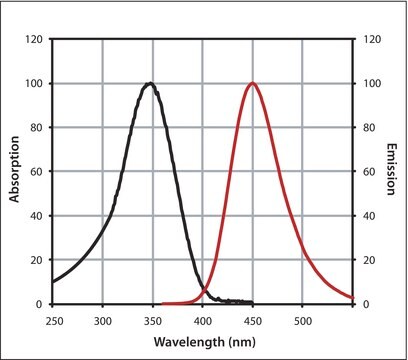MX488AS20
Mix-n-Stain™ CF™ 488A Antibody Labeling Kit (5-20μg)
Sign Into View Organizational & Contract Pricing
All Photos(8)
About This Item
UNSPSC Code:
12352203
NACRES:
NA.41
Recommended Products
form
liquid
Quality Level
storage condition
protect from light
fluorescence
λex 490 nm; λem 515 nm
storage temp.
−20°C
Related Categories
General description
This labeling kit is for labeling 5-20 μg antibody with the green fluorescent dye CF488A. Mix-n-Stain CF dye antibody labeling kits are a revolutionary antibody labeling technology that permits one to label antibodies with our superior CF dyes in 30 minutes without a purification step. The labeling procedure tolerates many common buffer components and antibody stabilizers. CF488A is a green fluorescent dye optimally excitable by the 488 nm argon laser line. Under common detection settings, CF488A is similar to Alexa Fluor™ 488 in brightness and photostability. In microscopy or flow cytometry applications using a 520/20 filter, CF488A may appear brighter than Alexa Fluor™ 488 due to its shorter emission wavelength, which makes the dye optically more compatible. The shorter wavelength of CF488A also minimizes the dye′s spill-over into longer wavelength channels, making the dye advantageous in multi-color detection. Like Alexa Fluor™488, CF488A is highly water soluble, but is not as excessively negatively charged. As a result, antibody conjugates prepared from CF488A retain excellent specificity to ensure high signal-to-noise ratio.
Application
The Mix-n-Stain CF dye antibody labeling kit can be used to label primary antibody for ELISA, western blot, immunohistochemistry, flow cytometry, immunofluorescence or immunocytochemistry applications.
Features and Benefits
Mix-n-Stain CF dye antibody labeling kits dramatically simplify the process of preparing fluorescently labeled antibodies, particularly primary antibodies. Simply mix your antibody with a CF dye of your choice in the buffer provided, a step that takes less than 30 seconds of hands-on time. After waiting for another 30 minutes, without a separation step, you will have a fluorescent antibody conjugate that is as good as the best pre-labeled fluorescent antibody you can buy from some of the leading suppliers. There is no need to calculate how much dye you should use; just mix your antibody with the entire amount of dye provided and you will always produce optimal labeling. Moreover, the labeling reaction can tolerate the presence of common stabilizers, such as sodium azide, Tris, glycerol and low level of BSA.
Components
The kit consists of 1 vial each of Mix-n-Stain Dye, Mix-n-Stain Reaction Buffer (10x), Mix-n-Stain Storage Buffer, and an ultrafiltration vial.
Analysis Note
Direct replacement for: Alexa Fluor™ 488, Cy®2, DY-495, DyLight®488, FAM, FITC, Fluorescein
Legal Information
This product is distributed by Sigma-Aldrich Co. under the authorization of Biotium, Inc. This product is covered by one or more US patents and corresponding patent claims outside the US patents or pending applications owned or licensed by Biotium, Inc. including without limitation: 12/334,387; 12/607,915; 12/699,778; 12/850,578; 61/454,484. In consideration of the purchase price paid by the buyer, the buyer is hereby granted a limited, non-exclusive, non-transferable license to use only the purchased amount of the product solely for the buyer′s own internal research in a manner consistent with the accompanying product literature. Except as expressly granted herein, the sale of this product does not grant to or convey upon the buyer any license, expressly, by implication or estoppel, under any patent right or other intellectual property right of Biotium, Inc. Buyer shall not resell or transfer this product to any third party, or use the product for any commercial purposes, including without limitation, any diagnostic, therapeutic or prophylactic uses. This product is for research use only. Any other uses, including diagnostic uses, require a separate license from Biotium, Inc. For information on purchasing a license to use this product for purposes other than research, contact Biotium, Inc., 3159 Corporate Place, Hayward, CA 94545, Tel: (510) 265-1027. Fax: (510) 265-1352. Email: btinfo@biotium.com.
ALEXA FLUOR is a trademark of Life Technologies
CF is a trademark of Biotium, Inc.
Cy is a registered trademark of Cytiva
DyLight is a registered trademark of Pierce Biotechnology, Inc.
Mix-n-Stain is a trademark of Biotium, Inc.
Disclaimer
Unless otherwise stated in our catalog or other company documentation accompanying the product(s), our products are intended for research use only and are not to be used for any other purpose, which includes but is not limited to, unauthorized commercial uses, in vitro diagnostic uses, ex vivo or in vivo therapeutic uses or any type of consumption or application to humans or animals.
Signal Word
Warning
Hazard Statements
Precautionary Statements
Hazard Classifications
Aquatic Chronic 3 - Met. Corr. 1
Storage Class Code
8A - Combustible, corrosive hazardous materials
WGK
WGK 3
Flash Point(F)
Not applicable
Flash Point(C)
Not applicable
Certificates of Analysis (COA)
Search for Certificates of Analysis (COA) by entering the products Lot/Batch Number. Lot and Batch Numbers can be found on a product’s label following the words ‘Lot’ or ‘Batch’.
Already Own This Product?
Find documentation for the products that you have recently purchased in the Document Library.
Customers Also Viewed
Click-Chemistry Based Allergen Arrays Generated by Polymer Pen Lithography for Mast Cell Activation Studies
Ravi Kumar
Small (2016)
Xiaoyu Ding et al.
EBioMedicine, 60, 102996-102996 (2020-09-20)
Pertuzumab is currently used in combination with trastuzumab as the first-line treatment for HER2-positive metastatic breast cancer. However, pertuzumab was originally developed independently from trastuzumab and was later incidentally found to have synergistic efficacy when combined with trastuzumab, it remains
A crucial requirement for Hedgehog signaling in small cell lung cancer.
Park, K.S., et al.
Nature Medicine, 11, 1504-1508 (2011)
Our team of scientists has experience in all areas of research including Life Science, Material Science, Chemical Synthesis, Chromatography, Analytical and many others.
Contact Technical Service